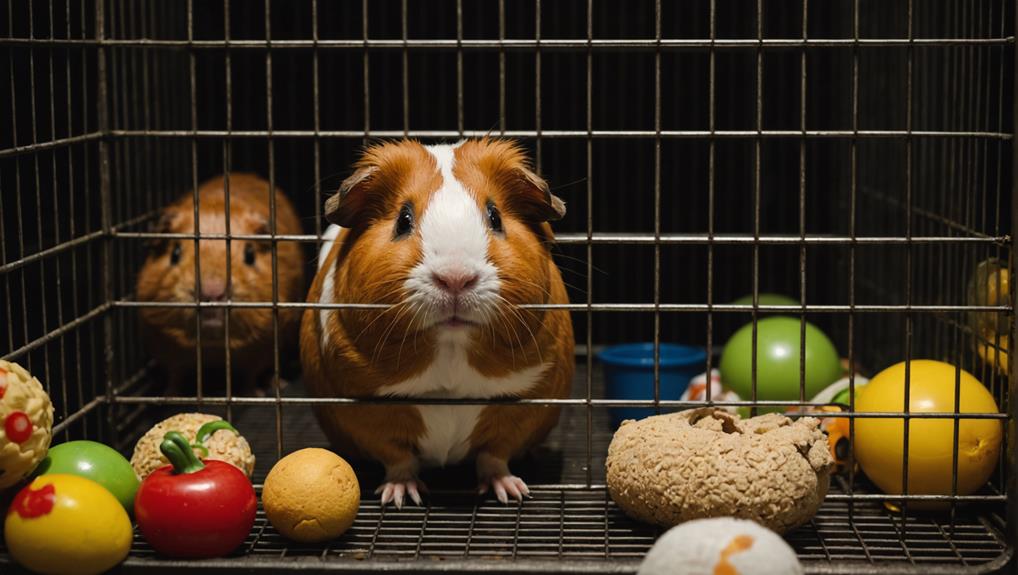How to Tell if Guinea Pig Has a Depression

To tell if your guinea pig has depression, look for decreased activity, frequent hiding, and reduced social interactions. Notice if they’re eating less, losing weight, or refusing favorite foods. Unusual lethargy and avoidance of you or other guinea pigs are also red flags.
- Pay attention to any changes in their vocal patterns, such as high-pitched or low rumbling sounds.
- Check their grooming habits; decreased grooming can signal emotional distress. Verify their environment is stimulating and spacious.
If these signs are present, consider consulting a veterinarian for further guidance. Learning more can help you guarantee your guinea pig’s well-being.
Key Signs of a Guinea Pig Depression
- Decreased activity levels or increased withdrawal are signs of depression.
- Loss of appetite and refusal of favorite foods can indicate emotional distress.
- Unusual lethargy suggests a need for a stimulating environment and regular health checks.
- Avoidance of social interactions with humans or other guinea pigs signals social withdrawal.
- Changes in vocal patterns, like high-pitched squeals, may indicate stress or depression.
Behavioral Changes
Regarding understanding if your guinea pig is depressed, behavioral changes are often the most telling signs. You might notice your pet becoming less active or more withdrawn. They could be hiding more frequently or showing less interest in social interactions, which might be due to environmental stressors or past trauma.
It’s essential to observe how they interact with other guinea pigs; changes in social dynamics can also be a red flag.
Evaluate your guinea pig’s cage setup. A cramped or uninteresting environment can contribute to their mood decline. Confirm their habitat is spacious, stimulating, and clean.
Sometimes, health issues might manifest as behavioral changes too. If your guinea pig is lethargic or less responsive, a visit to the vet is advisable to rule out any underlying health problems.
Pay attention to how they respond to their surroundings. Sudden noises or changes in their environment might stress them out, leading to depression. Make certain their living space is calm and consistent.
Appetite Loss
A significant indicator of depression in guinea pigs can be appetite loss. If your guinea pig isn’t eating as much as usual, it’s essential to take note. Weight changes are a key sign; monitor your pet’s weight regularly to detect any sudden drops. Changes in food preferences may also be a red flag. If your guinea pig suddenly refuses to eat their favorite foods, it could indicate a problem.
Hydration levels are similarly significant. Verify your guinea pig is drinking enough water, as dehydration can exacerbate health issues. Checking the water bottle or bowl daily will help you keep tabs on this. If you notice a decrease in hydration, it might be time to visit the vet.
Dietary adjustments can sometimes help if your guinea pig is experiencing appetite loss. Try offering a variety of fresh vegetables and hay to entice them to eat.
However, don’t make sudden changes to their diet without consulting a vet, as this could cause further stress.
Lethargy
Just as appetite loss can signal depression in guinea pigs, so can lethargy. If your guinea pig seems unusually inactive, it could be experiencing depression.
Environmental factors play a significant role in their well-being. Make certain their living space is clean, spacious, and stimulating. Regular health check ups are fundamental to rule out any medical issues causing lethargy.
Bonding time with your guinea pig is crucial. Spend quality time daily to strengthen your relationship and offer comfort.
Enrichment activities can also help combat lethargy. Provide a variety of toys, tunnels, and safe chew items to keep them mentally and physically engaged.
It’s essential to identify and minimize stress triggers in their environment. Loud noises, sudden changes, or the presence of other pets can cause stress, leading to lethargy.
Monitor your guinea pig closely for these signs and make necessary adjustments.
Creating a routine can also help. Guinea pigs thrive on consistency, so maintaining regular feeding, cleaning, and play schedules can reduce stress and improve their mood.
Social Withdrawal
When your guinea pig starts avoiding interaction with you or other guinea pigs, it might be exhibiting signs of social withdrawal. Social interactions are vital for a guinea pig’s well-being. Typically, they enjoy playtime activities and show enthusiasm when interacting with other guinea pigs or their human caretakers.
If you notice your pet hiding more often or retreating to the corners of its cage, this change in behavior could indicate social withdrawal.
Check the cage environment for any stressors. A crowded or poorly maintained cage can contribute to a guinea pig’s reluctance to engage. Verify the space is clean, spacious, and equipped with stimulating toys.
Monitor their bonding experiences with other guinea pigs. Sometimes, changes in companion dynamics can cause stress. If a new guinea pig has been introduced or if there’s been a recent loss, these events can impact their social behavior.
Spend extra time with your guinea pig to rebuild trust and encourage interaction. Gentle petting and offering treats can help.
Observing these changes and taking action can make a significant difference in your guinea pig’s emotional health. Addressing social withdrawal early can prevent further emotional decline.

Unusual Noises
Beyond social withdrawal, another indicator that your guinea pig might be experiencing depression is the emergence of unusual noises. Guinea pigs use a variety of vocal patterns to communicate, and any significant changes in these patterns can be a red flag.
Pay attention to the sound frequency and types of noises your pet makes. For instance, an increase in high-pitched squeals or low, continuous rumbling could be stress indicators.
Monitoring these vocal changes is vital because they serve as communication cues. When a typically quiet guinea pig suddenly becomes more vocal, or a normally chatty one goes silent, it may be attempting to express its emotional distress.
Listen for sounds that seem out of the ordinary or are repeated more frequently than usual. These can be subtle cries for help, indicating that your pet is feeling anxious or unhappy.
Understanding these vocal expressions helps you gauge your guinea pig’s emotional well-being. If you notice unusual noises persisting over time, it’s important to consult a veterinarian.
They can provide further insights and recommend ways to alleviate your pet’s stress, potentially improving its complete mental health.
Grooming Habits
A change in grooming habits can be a clear sign that your guinea pig is feeling depressed. Typically, guinea pigs maintain a consistent grooming frequency to keep their fur in good condition. If you notice that your guinea pig is grooming itself less often, it may indicate a lack of interest in self-care, which is a common symptom of depression.
Pay close attention to the fur condition. Healthy guinea pigs have smooth, shiny fur. If your guinea pig’s fur starts looking dull, matted, or dirty, it mightn’t be engaging in self grooming as it should. This is a signal that something might be wrong, and your pet could be experiencing emotional distress.
Using grooming tools during bonding time can help improve your guinea pig’s mood. Regular grooming sessions not only keep your pet clean but also provide an opportunity for you to bond.
This interaction can be comforting and reassuring for a guinea pig feeling down. Make sure to use gentle, appropriate grooming tools to avoid causing any discomfort.
Finally
To determine if your guinea pig is experiencing depression, watch for behavioral changes, appetite loss, lethargy, social withdrawal, unusual noises, and altered grooming habits. Monitor these signs closely and consult a veterinarian if you notice any concerning symptoms. Ensuring your guinea pig has a stimulating environment, regular social interaction, and a balanced diet can help maintain its mental well-being. Prompt attention to these signs can lead to early intervention and a healthier, happier pet.











